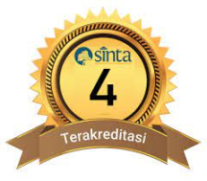the Effect of LKPD-Assisted Guided Inquiry Learning Model on Students' Understanding of Concepts in Physics Learning
Abstract
Full Text:
PDFReferences
P. S. Dewi, “Perspektif Guru sebagai Implementasi Pembelajaran Inkuiri Terbuka dan Inkuiri Terbimbing terhadap Sikap Ilmiah dalam Pembelajaran Sains,” Tadris J. Kegur. Dan Ilmu Tarb., vol. 1, no. 2, pp. 179–186, 2016.
C. E. Erlinawati, S. Bektiarso, and M. Maryani, “Model pembelajaran project based learning berbasis STEM pada pembelajaran fisika,” Fkip E-Proceeding, vol. 4, no. 1, pp. 1–4, 2019.
A. R. Harefa, “Peran Ilmu Fisika Dalam Kehidupan Sehari-Hari,” War. Dharmawangsa, vol. 13, no. 2, Art. no. 2, Jun. 2019, doi: 10.46576/wdw.v0i60.411.
N. S. Ulina, Pembelajaran Fisika di Kurikulum Merdeka. CV. Media Sains Indonesia, 2023. [Online]. Available: https://store.medsan.co.id/detail/978-623-195-462-6-pembelajaran-fisika-di-kurikulum-merdeka
Kemdikbud, “Kurikulum Merdeka,” ditpsd.kemdikbud.go.id. Accessed: Feb. 27, 2024. [Online]. Available: http://ditpsd.kemdikbud.go.id/hal/kurikulum-merdeka
M. Damiati, N. Junaedi, and M. Asbari, “Prinsip Pembelajaran dalam Kurikulum Merdeka,” J. Inf. Syst. Manag. JISMA, vol. 3, no. 2, Art. no. 2, 2024, doi: 10.4444/jisma.v3i2.922.
E. Suprapto, “Pengaruh Model Pembelajaran Kontekstual, Pembelajaran Langsung, dan Motivasi Berprestasi terhadap Hasil Belajar Kognitif,” INVOTEC, vol. 11, no. 1, Art. no. 1, 2015, doi: 10.17509/invotec.v11i1.4836.
C. D. T. Haspen and F. Festiyed, “Meta-Analisis Pengembangan E-Modul Berbasis Inkuiri Terbimbing Pada Pembelajaran Fisika,” J. Penelit. Pembelajaran Fis., vol. 5, no. 2, Art. no. 2, Dec. 2019, doi: 10.24036/jppf.v5i2.107442.
N. A. P. Lestari and A. R. Fatmawan, Model-Model Pembelajaran untuk Kurikulum Merdeka di Era Society 5.0. Nilacakra, 2023.
S. Sulistiyono, “Efektivitas Model Pembelajaran Inkuiri Terbimbing Terhadap Keterampilan Proses Sains Dan Pemahaman Konsep Fisika Siswa Ma Riyadhus Solihin,” J. Pendidik. Fis. Undiksha, vol. 10, no. 2, Art. no. 2, 2020, doi: 10.23887/jjpf.v10i2.27826.
N. A. Astri, H. Hufri, G. Gusnedi, and S. Y. Sari, “Validasi E-Modul Fisika Berbasis Model Pembelajaran Inkuiri Terbimbing Pada Materi Gelombang Kelas XI SMA/MA,” J. Pendidik. Tambusai, vol. 8, no. 1, pp. 5320–5330, Jan. 2024, doi: 10.31004/jptam.v8i1.13214.
K. O. Yanda, J. Jumroh, and D. Octaria, “Pengaruh Model Pembelajaran Inkuiri Terhadap Kemampuan Pemahaman Konsep Ditinjau Dari Motivasi Belajar Siswa,” Indiktika J. Inov. Pendidik. Mat., vol. 2, no. 1, Art. no. 1, Dec. 2019, doi: 10.31851/indiktika.v2i1.3428.
R. A. Gani, R. Purnamasari, and F. Mujahidah, “Penerapana Model Pembelajaran Inkuiri Terbimbing untuk Meningkatkan Hasil Belajar Mata Pelajaran Ilmu Pengetahuan Alam,” J. Elem. Teori Dan Has. Penelit. Pendidik. Sekol. Dasar, vol. 5, no. 2, pp. 170–174, Jun. 2022, doi: 10.31764/elementary.v5i2.9083.
N. Aslinda, H. Hufri, and H. Amir, “Design LKPD Terintegrasi Inkuiri Terbimbing Berbantuan Virtual Laboratory Pada Materi Fluida Dinamis Dan Teori Kinetik Gas Dalam Pembelajaran Fisika Kelas XI SMA,” PILLAR Phys. Educ., vol. 10, no. 1, Art. no. 1, Nov. 2017, doi: 10.24036/2559171074.
K. Nurcahyati, I. W. Distrik, and I. Wahyudi, “Pengaruh LKS Berbasis Inkuiri Terbimbing Materi Elastisitas Dan Hukum Hooke Terhadap Hasil Belajar Siswa,” J. Phys. Sci. Learn., vol. 2, no. 2, Art. no. 2, Dec. 2018.
R. Septian, S. Irianto, and A. Andriani, “Pengembangan Lembar Kerja Peserta Didik (LKPD) Matematika Berbasis Model Realistic Mathematics Education,” J. Educ. FKIP UNMA, vol. 5, no. 1, Art. no. 1, Jun. 2019, doi: 10.31949/educatio.v5i1.56.
M. Firdaus and I. Wilujeng, “Pengembangan LKPD inkuiri terbimbing untuk meningkatkan keterampilan berpikir kritis dan hasil belajar peserta didik,” J. Inov. Pendidik. IPA, vol. 4, no. 1, Art. no. 1, Apr. 2018, doi: 10.21831/jipi.v4i1.5574.
S. Sugiyono, Metode Penelitian Kuantitatif, Kualitatif, dan R&D. Bandung: Alfabeta, 2013.
B. Sumargo, Teknik Sampling. UNJ PRESS, 2020.
S. N. Margiastuti, P. Parmin, and S. D. Pamelasari, “Penenrapan Model Guided Inquiry Terhadap Sikap Ilmiah dan Pemahaman Konsep Siswa pada Tema Ekosistem,” Unnes Sci. Educ. J., vol. 4, no. 3, Art. no. 3, Dec. 2015, doi: 10.15294/usej.v4i3.8859.
C. C. Kuhlthau, L. K. Maniotes, and A. K. Caspari, Guided Inquiry: Learning in the 21st Century. Bloomsbury Publishing USA, 2015.
E. K. Nisa, T. Koestiari, M. Habibbulloh, and B. Jatmiko, “Effectiveness of guided inquiry learning model to improve students’ critical thinking skills at senior high school,” J. Phys. Conf. Ser., vol. 997, no. 1, p. 012049, Mar. 2018, doi: 10.1088/1742-6596/997/1/012049.
M. Faradilla, M. Hasan, and Sulastri, “The effectiveness of guided inquiry-based student worksheets on students’ generic science skills,” J. Phys. Conf. Ser., vol. 1088, no. 1, p. 012106, Sep. 2018, doi: 10.1088/1742-6596/1088/1/012106.
T. Suganda, P. Parno, and S. Sunaryono, “Analisis Kemampuan Berpikir Kritis Siswa Topik Gelombang Bunyi dan Cahaya,” J. Pendidik. Fis., vol. 10, no. 1, Art. no. 1, Mar. 2022, doi: 10.24127/jpf.v10i1.4118.
DOI: http://dx.doi.org/10.24036/16069171074








